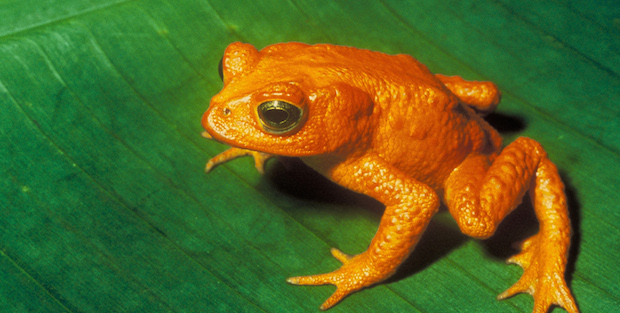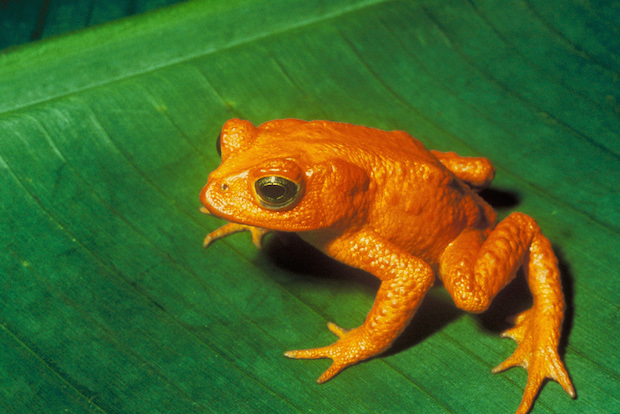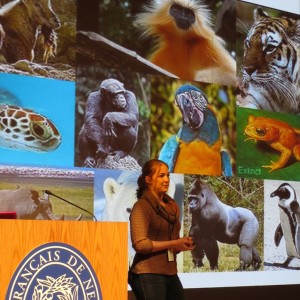A golden toad, one of the many species in danger of extinction (photo credit: Charles H. Smith)
A native of Biloxi, Mississippi, Rachel Nuwer grew up exploring the bayous and beaches of the Mississippi Gulf Coast. She pursued her interest in science and nature as an undergraduate student of Biology and English literature at Loyola University New Orleans. Afterward, she completed a master’s degree in ecology at the University of East Anglia. Finding herself to be a stronger writer than statistician, she sought to build a career in science journalism.
On Friday, March 14, Nuwer visited fifth graders at LFNY to share her research findings from Vietnam and answer critical questions for the fifth grade students about the wildlife trade.
First, she explained why species become endangered. Climate change and the illegal international wildlife trade are to blame for the extinction of certain species. Countries in Asia are the biggest consumers of the wildlife trade due to the high interest in and demand for exotic animal products for décor and consumption by the wealthier percentage of the population.
Rachel Nuwer, March 14 at the Lycée Français de New York.
Traditional Chinese medicine is also responsible for the interest in the purchasing of animals through the illegal wildlife trade. It is believed that certain animals, like elephants, turtles, seahorses, snakes, and bears, possess special healing properties. These animals are rare and highly coveted for their supposed medicinal value.
Next, Nuwer explained the research that she completed for her ecology master’s thesis. While studying at the University of East Anglia, she investigated the illegal wildlife trade and natural resource use in U Minh peat swamp forests of the Mekong Delta, Vietnam. U Minh is home to several globally threatened species like the pangolin. Pangolin are insect-eating mammals that live in tropical parts of Africa and Asia and are known as “scaly anteaters” for their unusual appearance. They are prized in traditional Chinese medicine for their scales and are also eaten as a delicacy. The demand for pangolin scales and meat is very high making the pangolin trade very lucrative.
Tree Pangolin by Valerius Tygart
What does this have to do with us?
Nuwer’s talk was a lesson in cultural sensitivity and relativity. While in U Minh, Nuwer interviewed locals about animal hunting. Everyone that she encountered denied having any knowledge of wildlife hunters in the area. After weeks of inconclusive questioning, she finally met someone willing to introduce her to a pangolin hunter. The man in question revealed that he only hunts pangolin in order to earn enough money to pay for his son’s medicine. His son suffers from a severe brain disease. The hunter isn’t proud of his occupation, however it helps him to provide for his family. He claims that he wouldn’t encourage his son to follow in his footsteps.
Nuwer then asked the audience as to whether or not they would have reported the pangolin hunter to the local authorities for his contribution to the dwindling pangolin population. The LFNY students vehemently replied that they would, however Nuwer retorted: “It isn’t always about the good guys versus the bad guys like in the movies.”
How can we help?
Don’t order shark fin soup. Don’t purchase snakeskin items or furs. Study ecology, conservation, or science. Spread the word about the illegal wildlife trade and animal suffering.
Nuwer also introduced students to Dr. Jill Robinson, founder and CEO of Animals Asia, which has established animal sanctuaries in China and Vietnam and rescued hundreds of moon bears from the “bear bile” farming industry. At the farms, bile is extracted (via metal catheter implanted in the abdomen) from the bear’s gallbladder for use in traditional Chinese medicines. At the sanctuaries, rescued bears undergo rehabilitation.
The Y5 students attending Rachel Nuwer’s presentation.
She also mentioned that the U.S. government has taken a stand against the illegal wildlife trade. In attempt to send a message to poachers, diminish the demand for ivory, and inspire other countries U.S. authorities pulverized 6 tons of seized ivory into dust in November 2013. The stockpile is a collection of tusks and ivory-derived products seized by U.S. authorities from interdictions, smugglers and even unwitting tourists over the past 25 years.
Once Nuwer’s presentation was complete, students had an opportunity to ask questions and share personal reflections. Although students seemed to be most fascinated by the treatment of bears hunted for their bile, there were a few anecdotes shared by students on how they are helping to save animals. A student named Julian discussed his parents’ decision to follow a vegan diet. Another young lady shared the fact that her family adopted a baby polar bear on WWF for her mother’s birthday. It seems that the fifth grade LFNY students are well on their way to becoming champions for endangered species.
About the Author :
Janelle Charles is Director of Admissions and Enrollment. She holds an MA in French Linguistics & Pedagogy from Middlebury College. She was a Teaching Fellow in NYC public schools and was previously a French and Spanish teacher at Greenwich Country Day, then Assistant Director of Admissions. She joined the Lycée in 2021.





